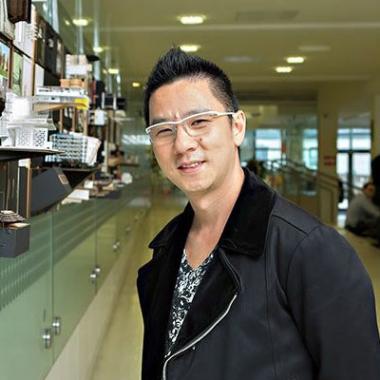Course Overview
Attendance
* Price per academic year
Course summary
The Master of Architecture (MArch) (RIBA pt II) is a long-established and well-respected course that is prescribed by the Architects Registration Board (ARB) and validated by the Royal Institute of British Architects (RIBA) to give exemption from the second stage of professional education. The emphasis of the course is on innovative design work, and on developing a caring and critical approach to the study and practice of architecture.
The course fosters diversity of choice, interpretation and approach, whether in design projects or more academic research. The former focuses on sophisticated design programmes (informal, technical, professional or urban terms) that demand rigour and self-criticism. The latter focuses on your major dissertation, an extended piece of specialised research into architecture and its historical or theoretical contexts.
The course has three main objectives: to develop your design ability through project-based experimentation; to present an evaluation and critique of your coursework within a broad cultural context, and in light of technical, economic and legal constraints; to promote the articulate explanation and representation of quality and value in design projects.
Top reasons to study with us
- RIBA/ARB accredited programme – A long-established and well-respected RIBA/ARB accredited programme
- Outstanding facilities – We have exceptional facilities including purpose-built studio spaces and a cutting-edge Fabrication Laboratory
- Award-winning students – Our students have won many international awards including RIBA President's Medals
- Diversity and choice – Our course gives you the opportunity to follow your own interests and direct your studies towards particular themes. Teaching is delivered through a selection of themed studio and seminar groups, each providing a unique methodological approach and a specific set of interests and ideas
- Learn from experts – We have a dedicated team of lecturers, tutors and specialist instructors, along with guest speakers, many of whom come from leading architectural practices
- Central London location – You'll study in the heart of central London with access to a host of museums, galleries and specialist libraries
Course structure
Consisting of two years of full-time study (Levels 6 and 7), the Master of Architecture (MArch) fulfils the RIBA/ARB criteria and regulatory framework for architectural registration, which allows it to offer exemption from the RIBA Part 2 examination.
Core Modules
This is a single year-long module consisting of interwoven strands of design and research brought together as a single project. Taken as a whole, the project encourages an interplay between research, design intentions, detailed practice, and critical brief writing. The nature of the Design Studio group system means that typically the student is able to choose from a number of alternative themes and project briefs described by studio tutors in presentations at the beginning of the academic year. Commonly, although not exclusively, the theme or context of the second semester work will be to explore further and develop the work undertaken in Semester 1. This second stage to the project will place greater emphasis on the detailed resolution of the design proposal: dealing more explicitly and critically with the issues of programme, brief, context, materiality and technology; and refining and developing an architectural response.
60 credits – Level 6
Architectural Reflections I is a composite module. It consists of four discrete components, each of which take the form of an independent series of lectures, workshops, seminars, and assessment elements. Led by experts in their fields, each component provides the frameworks necessary for holistic, reflective practice in architecture. These four layers are: Digital Design; Critical Practice; Applied Technical Studies 1; History and Theory.
- Digital Design encompasses computer-based design strategies and their requisite technologies. It introduces students to the principles of computational design and digital fabrication techniques
- Critical Practice builds on students’ own work experience and introduces statutory, professional and management aspects of professional practice to support the development of their coursework
- Applied Technical Studies 1 is directed by structured investigation into different kinds of technology and environmental design that can inform the work undertaken in studio groups
- History and Theory provides the framework for the teaching of cultural context in the MArch course, and aims to provoke a challenging and ambitious role for this subject area within postgraduate architectural education. History and Theory also provides a vehicle through which the students prepare a proposal and position themselves for their MArch 2 dissertation
60 credits – Level 6
Architectural Productions II is a year-long module based on the development of a single coherent design project. Established through the interplay between Design Hypothesis (research investigation and design development) and Design Thesis (resolution of the project as coherent design proposal), the completed project should articulate a clearly-stated, socially-relevant thesis signalling a high level of speculation, analysis and professional awareness. As a Master's level module, students are expected to pursue a challenging and sophisticated investigation into a given topic, and to arrive at a more resolved design thesis and proposal.
60 credits – Level 7
This module mirrors and continues the composite logic of Architectural Reflections I. Consisting of three components, it is the culminating module of the Master's course and provides the final ingredients of reflective practice prior to embarking on a professional career. These three component layers are: Dissertation; Applied Technical Studies 2; Strategic Report.
The coursework produced for the Dissertation component of this module provides a vehicle through which the student can demonstrate their ability to conduct a focussed, research-based study of a given subject. The topic chosen by each student is developed in the preceding History and Theory component of Architectural Reflections I, progressing to a 10,000-word Dissertation.
The Applied Technical Studies component, concurrent with the development of the main design thesis (Architecture Productions II), culminates in material and technological specialisation, concluding with a submission explaining the resolved environmental, structural and constructional strategies.
The final component of this module is a Strategic Report, which is also complementary to the design project and to Applied Technical Studies. Strategic Report focuses on integrating the key professional, managerial and statutory concepts explored in Critical Practices into the final design thesis.
60 credits – Level 7
Course climate action statement
Driven by the urgent need to address the environmental impact of architecture and the building industry, the MArch course will encourage and support creative and innovative solutions to the challenges presented by climate change. Recognising that meeting this challenge cannot be achieved with technical know-how alone, critical reflection on the wider political, cultural and social implications of our changing climate will be integrated into the course.
Architecture Tour and Facilities
Watch the video below to find out more about our facilities at the University's Marylebone Campus.
For more details on course structure, modules, teaching and assessment Download the programme specification (PDF).
To request an accessible version please email [email protected]
Get your copy of the University of Westminster prospectus and browse the range of courses on offer.
Contact us for general course enquiries:
+44 (0)20 7911 5000 EXT 65511
(Mon–Fri, 10am–4pm BST)
Live chat with us
(Mon–Fri, 10am–4pm BST)
Open evenings
Join us at an open evening online or on campus. Get a feel for student life at the University of Westminster and talk to course leaders and our support teams.
Can't attend? See more open events
Careers
Most students who complete the Master of Architecture (MArch) (RIBA Part II) are subsequently employed in architectural offices and go on to take the Part III exam to become registered architects. Other students progress to take further Master’s or PhD degrees and then go into research or teaching.
This course also provides a grounding for a wealth of other related careers in design and the creative industries.
Industry experts
You’ll be taught by a dedicated team of lecturers, tutors and specialist instructors, along with guest speakers, many of whom come from leading architectural and engineering practices.
Focus on your area of interest
Our course gives you the opportunity to follow your own interests and direct your studies towards particular themes.
Employers around the world
The University’s Careers and Employability Service has built up a network of over 3,000 employers around the world, helping all our students explore and connect with exciting opportunities and careers.
Industry links
Many of our course tutors, visiting lecturers and specialist instructors are from leading architectural and engineering practices. This provides an essential link with the industry and ensures that our course content remains relevant and up-to-date.
We also run a series of technical studies guest lectures with speakers drawn from architectural and engineering practice.
Graduate employers
Graduates from this course are employed by many leading architectural practices including:
- Allies and Morrison
- Bolles+Wilson
- David Miller Architects
- Foster + Partners
- Grimshaw
Our graduates

Eleanor Riley
Master of Architecture (MArch) (RIBA Pt II)
My course spanned over two years, and throughout, it never felt repetitive or monotonous. I appreciated the variety and the balance of the course. I was able to make models by attending various workshops, go on trips, be exposed to new environments and learn from new teaching styles that complemented each of the modules. The course supported me to build on skills whilst providing me with the freedom to test them out in real-world projects and in other mediums that the University offered.

Simhika Rao
Master of Architecture (MArch) (RIBA pt II)
The design unit I joined in my first year was ideally suited to my interests and skill set and I stayed in the same unit for my second year. I enjoyed the strong theoretical emphasis our briefs offered and the ability to express and develop my design aesthetic throughout the course. I thoroughly enjoyed the time I spent at Westminster; it was challenging and demanding, but extremely fulfilling and fun.

Wai Tang
Master of Architecture (MArch) (RIBA pt II)
The experience was a complete game changer for me. When I came to Westminster, I knew about the fundamentals of design, but I didn't know how to pitch my projects to potential clients. At Westminster, I learnt how to tell a story with my designs, and how to illustrate my ideas so others would share my vision. This has since won me many contracts.
Our graduates

Molly Harper
Architecture MArch - 2022
The most stand-out facility is undoubtedly the Fabrication Laboratory (FabLab). You can take lessons in metalwork, woodwork, CNC machines, 3D printers, laser cutting and ceramic workshops. The new digital equipment enables design and fabrication processes, including ABS and plaster 3D printing, CNC knife cutting, large-scale CNC routing, CNC metal milling and robot fabrication.

Xiao Ma
Master of Architecture (MArch), RIBA Part 2 - 2020
Studying at Westminster was an exceptional experience. If you are considering this course or studying at the University, I would suggest taking advantage of the learning opportunities, resources, trips and platforms that the University offers. Utilise the facilities and immerse yourself in the environment as it is a unique university experience. More importantly, enjoy being a student in London and get the most out of this city!

Robert Beeny
Master of Architecture (MArch) (RIBA pt II) - 2020
The quality of teaching on the course was first-class, whether in a lecture format or a 1:1 setting. All the staff members were very approachable and supportive.
Westminster OPEN Degree Show
Westminster's OPEN Degree Show celebrates the talent and diversity of our architecture and design students. In addition to a physical exhibition held at our Marylebone Campus, you can see the latest online collection on Westminster OPEN Degree Show.
Image: student work by Shah-Ree Tasaddiq – Architecture BA
Westminster Employability Award
Employers value graduates who have invested in their personal and professional development – and our Westminster Employability Award gives you the chance to formally document and demonstrate these activities and achievements.
The award is flexible and can be completed in your own time, allowing you to choose from a set of extracurricular activities.
Activities might include gaining experience through a part-time job or placement, signing up to a University-run scheme – such as mentoring or teaching in a school – or completing online exercises.
Read more about our Westminster Employability Award.
Course Leader

Richard Difford
Principal Lecturer
Richard Difford is an experienced academic with expertise in creative technologies and architectural history. His primary interest is the productive interactions that take place between art and science, and in particular the history of architectural representation and the role played by geometry in design. He also specialises in the use of electronics, programming and computational design. He has published numerous academic papers and supervised a number of award-winning dissertations including two Royal Institute of British Architects (RIBA) dissertation medals.
MArch provides the facilities and tutorial support that you’ll need to pursue your individual interests, and to gain the knowledge and skills you require for a career in architecture.
Course Team
- Wilfred Achille - Co-Course Leader in Architecture (Part 3)
- Dr Alessandro Ayuso - Senior Lecturer
- Peter Barber - Reader
- Dr Susanne Bauer - Senior Lecturer
- Anthony Boulanger - Senior Lecturer
- Professor Lindsay Bremner - Professor
- Professor Stephen Brookhouse - Staff
- Toby Burgess - Lecturer
- Professor Harry Charrington - Head of School - Arch & Cities
- John Cook - PTVL - DCDI
- Miriam Dall'Igna - PTVL - DCDI
- Dusan Decermic - Senior Lecturer
- Professor Davide Deriu - Reader
- Francois Girardin - Senior Lecturer
- Professor Sean Griffiths - Professor
- Dr Nasser Golzari - Senior Lecturer
- Dr Kate Jordan - Reader
- Mary Konstantopoulou - PTVL - DCDI
- Gillian Lambert - Lecturer
- Dr William Mclean - Reader
- Michael McNamara - PTVL - DCDI
- Arthur Mamou-Mani - Lecturer
- Andrei Martin - Senior Lecturer
- Laura Nica - Staff
- Samir Pandya - Associate Head - DCDI - ER
- Diana Periton - Lecturer
- Stuart Piercy - PTVL - DCDI
- Ben Pollock - PTVL - DCDI
- Shahed Saleem - Reader
- Dr David Scott - Principal Lecturer
- Dr Yara Sharif - Senior Lecturer
- Geoffrey Shearcroft - Staff
- Elite Sher - Staff
- Peter Silver - Senior Lecturer
- Dr Ro Spankie - Assistant Head of School
- Afolabi Spence - PTVL - DCDI
- Ben Stringer - Senior Lecturer
- Andrew Yau - Senior Lecturer
Why study this course?
Outstanding facilities
We have excellent facilities including purpose-built studio spaces and our cutting-edge Fabrication Laboratory.
Central London location
You’ll study in the heart of central London with a host of museums, galleries and specialist libraries on our doorstep.
Entry Requirements
A minimum of an upper second class honours degree (2:1) or a lower second class honours degree (2:2) in architecture or a similar subject area, which will normally be validated by the RIBA for Part 1/ prescribed by the ARB for Part 1. Applicants will usually have one year of (post-degree) professional experience. Applicants with a lower second class honours degree (2:2) will require significant experience.
At the interview, applicants should present their academic portfolio together with examples of work undertaken during professional training and any relevant contextual material.
If your first language is not English, you should have an IELTS 7.0 overall with 6.5 in all components.
Applicants are required to submit one academic reference.
Recognition of prior learning and experience
If you have previously studied at university level, or have equivalent work experience, academic credit may be awarded towards your course at Westminster. For more information, visit our Recognition of Prior Learning page.
Application process
Visit our How to apply page for more information on:
- the application process
- what you need to apply
- deadlines for applications
A minimum of an upper second class honours degree (2:1) or a lower second class honours degree (2:2) in architecture or a similar subject area, which will normally be validated by the RIBA for Part 1/ prescribed by the ARB for Part 1. Applicants will usually have one year of (post-degree) professional experience. Applicants with a lower second class honours degree (2:2) will require significant experience.
At the interview, applicants should present their academic portfolio together with examples of work undertaken during professional training and any relevant contextual material.
If your first language is not English, you should have an IELTS 7.0 overall with 6.5 in all components.
Applicants are required to submit one academic reference.
Recognition of prior learning and experience
If you have previously studied at university level, or have equivalent work experience, academic credit may be awarded towards your course at Westminster. For more information, visit our Recognition of Prior Learning page.
Application process
Visit our How to apply page for more information on:
- the application process
- what you need to apply
- deadlines for applications
More information
University preparation courses
Our partner college, Kaplan International College London, offers Pre-Master’s courses that may help you gain a place on a postgraduate degree at Westminster.
To find out more, visit University preparation courses.
A minimum of an upper second class honours degree (2:1) or a lower second class honours degree (2:2) in architecture or a similar subject area, which will normally be validated by the RIBA for Part 1/ prescribed by the ARB for Part 1. Applicants will usually have one year of (post-degree) professional experience. Applicants with a lower second class honours degree (2:2) will require significant experience.
At the interview, applicants should present their academic portfolio together with examples of work undertaken during professional training and any relevant contextual material.
If your first language is not English, you should have an IELTS 7.0 overall with 6.5 in all components.
Applicants are required to submit one academic reference.
Recognition of prior learning and experience
If you have previously studied at university level, or have equivalent work experience, academic credit may be awarded towards your course at Westminster. For more information, visit our Recognition of Prior Learning page.
Application process
Visit our How to apply page for more information on:
- the application process
- what you need to apply
- deadlines for applications
A minimum of an upper second class honours degree (2:1) or a lower second class honours degree (2:2) in architecture or a similar subject area, which will normally be validated by the RIBA for Part 1/ prescribed by the ARB for Part 1. Applicants will usually have one year of (post-degree) professional experience. Applicants with a lower second class honours degree (2:2) will require significant experience.
At the interview, applicants should present their academic portfolio together with examples of work undertaken during professional training and any relevant contextual material.
If your first language is not English, you should have an IELTS 7.0 overall with 6.5 in all components.
Applicants are required to submit one academic reference.
Recognition of prior learning and experience
If you have previously studied at university level, or have equivalent work experience, academic credit may be awarded towards your course at Westminster. For more information, visit our Recognition of Prior Learning page.
Application process
Visit our How to apply page for more information on:
- the application process
- what you need to apply
- deadlines for applications
More information
University preparation courses
Our partner college, Kaplan International College London, offers Pre-Master’s courses that may help you gain a place on a postgraduate degree at Westminster.
To find out more, visit University preparation courses.
Student work
Our end-of-year exhibition, OPEN, showcases student work from our undergraduate architecture and interiors courses and the Master of Architecture (MArch) RIBA Part 2 course.
Watch the video below of the most recent exhibition or see the latest online collection on Westminster OPEN Degree Show. You can also look through catalogues from our OPEN 2021 exhibition and OPEN 2020 exhibition on ISSUU.com.
OPEN 2023 – end-of-year exhibition video
Student blog
Wewanttolearn.net - A blog by Design Studio 10 of our MArch (RIBA Part 2) course. View student work, news and more on Wewanttolearn.net
Student success
The success of our architecture and interiors students has been recognised by a wide range of external awards. Read more about the success of our students.
Learn new skills
Volunteer and gain new skills
We offer a number of different volunteering opportunities for you to learn new skills, create connections, and make a difference in the community.
Develop your entrepreneurial skills
Our award-winning Westminster Enterprise Network offers industry networking events, workshops, one-to-one business advice and support for your start-up projects.
Get extra qualifications
We provide access to free online courses in Adobe and Microsoft Office applications, as well as thousands of specialist courses on LinkedIn Learning.
Fees and Funding
UK tuition fee: £9,535 (Price per academic year)
Find out how we set our tuition fees.
Funding
As well as tuition fee loans, there is a range of funding available to help you fund your studies.
Find out about postgraduate student funding options.
Scholarships
The University is dedicated to supporting ambitious and outstanding students and we offer a variety of scholarships to eligible undergraduate students, which cover all or part of your tuition fees.
Find out if you qualify for one of our scholarships.
Additional costs
See what you may need to pay for separately and what your tuition fees cover.
International tuition fee: £15,500 (Price per academic year)
Find out how we set our tuition fees.
Funding
Find out about funding for international students.
Scholarships
The University is dedicated to supporting ambitious and outstanding students and we offer a variety of scholarships to eligible undergraduate students, which cover all or part of your tuition fees.
Find out if you qualify for one of our scholarships.
Additional costs
See what you may need to pay for separately and what your tuition fees cover.
UK tuition fee: £9,535 (Price per academic year)
Find out how we set our tuition fees.
Funding
As well as tuition fee loans, there is a range of funding available to help you fund your studies.
Find out about postgraduate student funding options.
Scholarships
The University is dedicated to supporting ambitious and outstanding students and we offer a variety of scholarships to eligible undergraduate students, which cover all or part of your tuition fees.
Find out if you qualify for one of our scholarships.
Additional costs
See what you may need to pay for separately and what your tuition fees cover.
International tuition fee: £15,500 (Price per academic year)
Find out how we set our tuition fees.
Funding
Find out about funding for international students.
Scholarships
The University is dedicated to supporting ambitious and outstanding students and we offer a variety of scholarships to eligible undergraduate students, which cover all or part of your tuition fees.
Find out if you qualify for one of our scholarships.
Additional costs
See what you may need to pay for separately and what your tuition fees cover.
Facilities
Find out more about facilities at the School of Architecture and Cities.
Find out more about facilities at the School of Architecture and Cities.
Teaching and Assessment
Below you will find how learning time and assessment types are distributed on this course. The graphs below give an indication of what you can expect through approximate percentages, taken either from the experience of previous cohorts, or based on the standard module diet where historic course data is unavailable. Changes to the division of learning time and assessment may be made in response to feedback and in accordance with our terms and conditions.
How you’ll be taught
Teaching methods across all our postgraduate courses focus on active student learning through lectures, seminars, workshops, problem-based and blended learning, and where appropriate practical application. Learning typically falls into two broad categories:
- Scheduled hours: examples include lectures, seminars, practical classes, workshops, supervised time in a studio
- Independent study: non-scheduled time in which students are expected to study independently. This may include preparation for scheduled sessions, dissertation/final project research, follow-up work, wider reading or practice, completion of assessment tasks, or revision
How you’ll be assessed
Our postgraduate courses include a variety of assessments, which typically fall into two broad categories:
- Practical: examples include presentations, podcasts, blogs
- Coursework: examples include essays, in-class tests, portfolios, dissertation
Data from the academic year 2024/25
Research groups
Our research achieves real-world impact and we are proud to claim a rich and diverse profile of high-quality research and knowledge exchange in a wide range of disciplines.
Find out more about our research groups related to this course:
Supporting you
Our Student Hub is where you’ll find out about the services and support we offer, helping you get the best out of your time with us.
- Study support – workshops, 1-2-1 support and online resources to help improve your academic and research skills
- Personal tutors – support you in fulfilling your academic and personal potential
- Student advice team – provide specialist advice on a range of issues including funding, benefits and visas
- Extra-curricular activities – volunteering opportunities, sports and fitness activities, student events and more
Course Location
In the heart of London, our Marylebone Campus is home to the Westminster Business School and our Architecture, Planning and Tourism courses. Specialist workshops, dedicated digital and architecture studios, and our extensive Marylebone Library offer students everything they need for academic success.
Marylebone Campus is opposite Baker Street tube station and within easy walking distance of Regent's Park and Marylebone High Street.
For more details, visit our Marylebone Campus page.
Contact us
Call our dedicated team on:
+44 (0)20 7911 5000 ext 65511
Opening hours (GMT): 10am–4pm Monday to Friday
Opening hours (GMT): 10am–4pm Monday to Friday
Your Westminster
Book an open day. Order a prospectus. Sign up for newsletters.
















